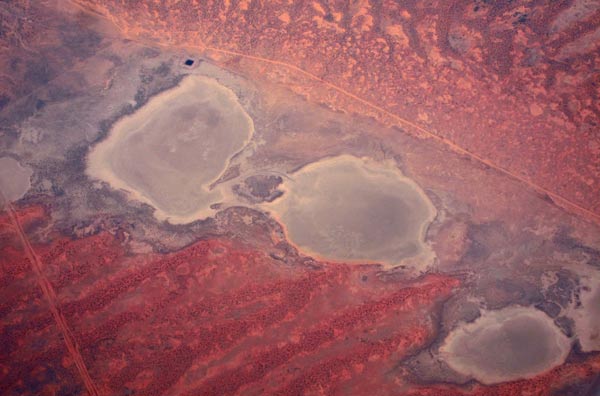Australia risks missing climate change commitments: report
Updated: 2016-02-22 13:58
(Xinhua)
|
||||||||
 |
|
Roads and a small dam can be seen next to dried-up lakes located in outback Australia in this aerial picture taken on Dec 13, 2015. [Photo/Agencies] |
The Commonwealth Scientific and Industrial Research Organisation (CSIRO) recently announced it would halve the number of employees in its climate science program, with approximately 100 jobs to go from it's two main climate monitoring and modelling stations.
The losses are in response to significant budget cuts by former Australian Prime Minister and climate change sceptic Tony Abbott, but also current Australian Prime Minister Malcolm Turnbull's drive for increased scientific innovation.
As a result, the nation's chief climate advocacy group, Sydney-based Climate Council, looked into the national and international ramifications of the reductions, finding it would cut the nation's ability to respond to climate change but also have detrimental impacts to its growing export industries, according to its report titled: Flying Blind; Navigating Climate Change without the CSIRO.
The report follows a protest letter signed by thousands of international climate scientists that said the job losses proceed, without being filled elsewhere, Australia would not develop its capability to assess the accelerating risks associated with climate change.
The report's author Professor Will Steffen argues critical information about climate change in the Southern Hemisphere would be lost and it will also be detrimental to the billion dollar industries, such as agriculture that relies on CISRO climate modelling.
"Cutting climate science now, as the demand escalates for both adaptation and mitigation strategies, is just like flying into a violent storm and ripping out the radar, navigation and communication instruments," Steffen said in a statement.
Australia's rural exports are playing an ever more important role as the nation's economy transitions away from mining-led growth to capitalise on the high quality food needs of the emerging Asian middle class, accounting for 45.2 billion Australian dollars in 2015.
CSIRO's research has been assisting farmers with tools, technologies and forecasts to manage more frequent and severe droughts. Joint studies with the body have led to breakthroughs in agriculture production, such as sunscreen for grapes or genetically modified drought resistant grain.
"Climate science also supports bushfire responses by providing the knowledge underpinning high fire danger weather warnings and fire behaviour predictions," Steffen said.
However, what is most embarrassing for the nation, Steffen said if the cuts proceed, Australia will have already reneged on a key promise in the Paris Climate Change agreement.
"Australia, along with the rest of the world's nations, agreed to strengthen climate science as a fundamentally important component of meeting the climate change challenge," Steffen said.
CSIRO chief executive Larry Marshall has previously said the restructure decision would enable new research in how to live with climate change and help meet the government's innovation strategy. No final decision has been made on which programs would be closed.
- Missing children found safe in nearby village
- Rich Chinese splurge on sportswear as luxury's lustre dims
- Urgent remedy sought for pediatrician shortage
- China starts safety check for school buses as new semester draws near
- Ticket scalpers face crackdown at Beijing hospitals
- Judicial DNA test in hot demand after policy change
- Classic Car Show kicks off in London
- Balkan, Austria police agree to register refugees on Macedonian border
- Turkey blames Kurdish militants for Ankara bomb; vows reprisals
- Britain scrambles fighters to intercept Russian bombers
- Chinese community to protest against Peter Liang's verdict
- Car bomb attack on military in Turkish capital kills 28

 The world in photos: Feb 15 - 21
The world in photos: Feb 15 - 21
 Lantern Festival in the Chinese paintings
Lantern Festival in the Chinese paintings
 Meet Melanie, the real-life mermaid
Meet Melanie, the real-life mermaid
 88th Academy Awards Governors Ball Press Preview
88th Academy Awards Governors Ball Press Preview
 Chinese photographers' work shines in major photo contest
Chinese photographers' work shines in major photo contest
 Egg carving master challenges Guinness World Record
Egg carving master challenges Guinness World Record
 Missing children found safe in nearby village
Missing children found safe in nearby village
 Madonna's world tour lands in Hong Kong
Madonna's world tour lands in Hong Kong
Most Viewed
Editor's Picks

|

|

|

|

|

|
Today's Top News
What ends Jeb Bush's White House hopes
Investigation for Nicolas's campaign
Will US-ASEAN meeting be good for region?
Accentuate the positive in Sino-US relations
Dangerous games on peninsula will have no winner
National Art Museum showing 400 puppets in new exhibition
Finest Chinese porcelains expected to fetch over $28 million
Monkey portraits by Chinese ink painting masters
US Weekly

|

|







